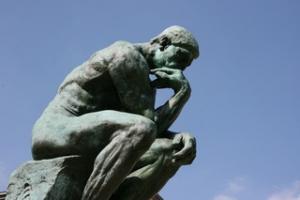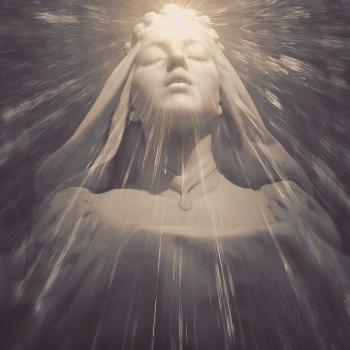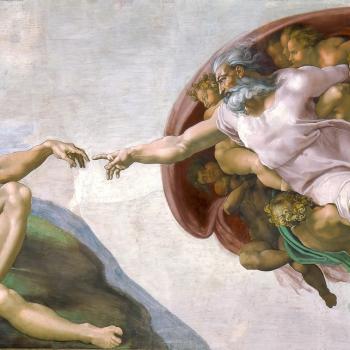Maybe it came out of the boredom and diminished activity that went along with the pandemic-related shutdown we all endured over the past year, but I’ve been brooding lately over the question: “What is the ultimate point of existence?”
If at this stage, our post-pandemic goal, personally or as a society, is simply to get back to an “old normal”, in the long term Big Picture, is that sufficient reason to be? (“raison d’être” – Jean Paul Sartre)
In other words, if I/we aspire toward some progressive, enlightened, perhaps even transcendental state of being, yet I feel bored, under-stimulated, and uninspired today, how much more so would be any grand creative Being or system that was responsible for my being here? One would hope there must be more to the story.
The Mundane vs The Sublime
It seems the bulk of people’s lives are taken up simply by “taking care of business” — daily maintenance, staying healthy, getting an education, a career, a family, meeting ongoing obligations — maybe creating something of benefit for society. All of that, broken up with some entertainment and pleasure seeking. Not that any of this is wrong, but with all of the universal and evolutionary complexity that went into our arriving at this point … why? In the sentiment of that old Peggy Lee song: “Is that all there is?”
Because I have a few hardcore atheist life-is-all-a-random-accident friends, I tend to make a note of all of the incredible, incomprehensible complexity and interdependence that goes into making up living systems — and even many “non-living” ecological systems. It’s hard not to see these as the product of some sort of coordinated design.
Yet what is it all for? Most of nature just does what it does — stars form and explode, planets form and at least one of them forms the chemistry for life. Plants sprout, grow, seed, and die. Animals birth, feed, grow, reproduce — then feed others or decline and die. What is the point?
Consider the butterfly. A caterpillar (a miracle of biological engineering), feeds on plant leaves (another miracle of biological engineering).Then, by a process science does not fully understand, the caterpillar turns its body into a chrysalis housing wherein its innards completely dissolve. About a week later, out emerges an entirely different creature that flits about for a few days, sips a few flowers, lays some eggs, then — kaput! All of that complexity to do pretty much the same thing that a single-celled bacterium does. Why was all of that extra effort necessary?
I was hiking in the coastal canyons of California and admired the vast, beautiful panoply of trees lining the canyon. In the best case, these trees grow for a century or so, then die off and fall down the canyon. So, what was the point? What was all of that magnificence for?
Religionists might maintain that it is all to the glory of God; as though the latter is some sort of divine cosmic narcissist who needs constant praise and worship in order to feel satisfied.
Eastern mystics and New Age philosophers might hold that the simple gift of be-ing is the end in itself. Just sit on a park bench and “bliss-out”. Well, a rock can do that. Shouldn’t we be setting the bar a little higher?
In the various ways one might bifurcate humanity into two camps (masculine/feminine, liberal/conservative, atheist/believer, leader/follower, etc.) one more division seems to be those who see life as cyclical versus those who see it as progressive. Some find joy and fulfillment in playing their same role, in a responsible manner, for their productive years. Others on the other hand need a sense of forward/upward progress in order to feel that their lives were adequately lived. Both are probably necessary, so no judgement is implied here.
For those of us in the latter camp, we like to believe (or can only hope) that our species and planet — or the cosmos as a whole — are on a purposeful trajectory toward some grander state of being. In view of Complexity/Chaos Theory however, such a grander state can not wholly be conceived of until it begins to emerge (yet I’m betting it does not involve much harp-playing and cloud-sitting).
Tilting Toward Higher Meaning
One answer for Peggy Lee and the rest of us who hope for more meaning comes out of the philosophical interpretations of quantum physics. In theory, systems at the quantum level by default exist only in a state of probability. Particles like quarks and electrons do not “collapse” to a fixed, stable, definite position until observed by a conscious observer. Yet the “particle” never actually exists as an independent object. It is simply one observed fluctuation in its underlying field — and such fields in principle are universal. (If this seems crazy, you’re not alone. Even according to its founders, quantum physics is impossible to fully comprehend. Yet its usefulness as a theory makes it the current standard.)
The point of the above is that the particle, even if it does not exist in actuality, it is a useful symbol that can be worked with to accomplish useful things (like using a computer monitor to type this document, using symbolic letters on a symbolic sheet of paper).
In his 2019 book “The Case Against Reality – Why Evolution Hid the Truth From Our Eyes” physicist Donald Hoffman, moves up from the quantum world to the macroscopic world of daily life, making the case that life evolved not to perceive reality as it objectively exists, but rather to interpret it as a set of symbols that enhance our survival fitness. One simple but striking example: that which we experience as ‘color’ does not actually exist in nature. Nothing is actually red or green or blue in itself. Objects simply reflect various wavelengths of light. Yet because our brains cannot easily measure wavelength, it instead creates the experience of color as a symbolic representation of the energetic frequency.
If everything in the world of experience is symbolic in a similar way, it is not a big step to conclude that there must be more to life, world, and cosmos than literally “meets the eye”. We are the “particles”, yet we live in a universal “field”.
Accordingly, if I or others feel depressed about the lack of meaning in life, it is important to note that although we spend our days playing with symbols — which often provide the sense or appearance of meaningful activity — there may well be dimensions far deeper to such activity.
Money provides an instructive analogy. Money was created as a symbol for value. Historically, it was often difficult to trade many large or not-yet-existent goods and services at a single point in time at a marketplace. So the symbolic money-tokens for that value were created to facilitate such transactions.
Today, the symbolic tokens of money have become so ubiquitous — virtually a religion to some — that there are now whole industries (banking, insurance, Wall St., cryptocurrency) devoted to trading in symbols, devoid of any attachment to a particular underlying reality. Perhaps because of that detachment, many of the ultra-wealthy seem perpetually unsatisfied and so must seek ever more.
Perhaps the same sense of lack that drives a billionaire to seek trillionaire status also lies at the heart of the existential dissatisfaction described at the outset of this article.
Just as the acquisition of money may be gratifying in the short-term but is ultimately unsatisfying until one actually does something with it, perhaps the gift of “symbolic” experience in the world can be rewarding enough for the decades of a normal lifespan. Yet some of us long for these experiential symbols to ultimately have a deeper meaning and purpose. We long to transcend the symbolic and participate in whatever larger reality and agenda may underlie worldly existence. If our thoughts and actions at the level of appearance also reverberate outward with deeper, subtle ramifications, it would be wonderful to gain greater understanding of that whole …
… in that way, we might know, ultimately, why we exist.
[Author’s Note: If you the reader have any hoped for vision regarding the nature of future existence, it would be wonderful to read those in the comments following this article.]













